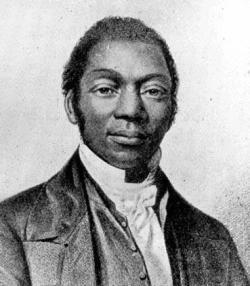Push to award Yale’s first Black student a posthumous degree faces administrative setbacks
Rev. James Pennington attended Yale nearly 200 years ago, and now some students want to give him a degree.

Wikimedia Commons
Almost 200 years since Reverend James Pennington — a former slave — became the first Black student to attend the Yale Divinity School and the University at large, students are pushing for Yale to award him a posthumous degree — and they are running into bureaucratic barriers along the way.
Pennington was prohibited from officially enrolling due to an 1832 Connecticut law; however, he was able to sit in on lectures as long as he did not speak in class. Noah Humphrey DIV ’23 recently wrote an opinion piece arguing for the University to award Pennington a posthumous honorary degree. The University has previously rejected requests to award Pennington a regular degree, and Associate Vice President for Institutional Affairs Martha Schall outlined that Yale has a policy against awarding posthumous degrees. Still, Humphrey has continued his advocacy to get Pennington a degree. Now, Dean of the Divinity School Gregory Sterling is sympathetic to the effort, which has gotten bogged down in the upper administration.
“Are we going to allow the law to stand in the way of Pennington getting a degree?” Humphrey said in an interview with the News. “Are we going to continue to be the barrier that separates Pennington and his life work away from being awarded a simple degree, done by the institution that has first housed James Pennington, essentially locking him out of our own doors?”
Pennington had a long, prestigious career, including the publication of the first African American history textbook in 1841, and later the receipt of an honorary doctorate by Heidelberg University in 1849.
There have been prior pushes to award Pennington a degree, including a 2016 petition with over 500 signatures, but all attempts were either rejected or went unacknowledged by the University due to its policy against awarding posthumous degrees. This policy was reinforced by the fact that the Divinity School is unsure which courses Pennigton took — including if he completed any degree requirements.
“Yale has a policy to not award posthumous degrees,” Sterling wrote in an email to the News. “I have not tried to change the policy, but to find a way within Yale’s policies to get him a degree.”
Sterling said that he tried on two occasions — unsuccessfully — to get Pennington a degree: first, a Master of Divinity degree, and then a Bachelor of Divinity. He added that he has a “different strategy at present” and has not given up hope that Pennington will one day receive a Yale degree.
Apart from the degree, the Divinity School has honored Pennington by renaming S100, one of the school’s largest classrooms, after him. The school has also hung a commissioned portrait of him in its common room.
“The Honorary Degrees Committee has a longstanding practice that honorary degrees are not granted posthumously,” Schall wrote in an Oct. 11, 2021 email to the News. “The only exceptions, including Rabbi Lord Jonathan Sacks, are in the sad circumstances in which the recipient accepted the invitation to receive the degree, agreed to the requirement that he or she attend Commencement to receive the degree in person, but died between the acceptance of the invitation and the Commencement date. Therefore, the committee would not be open to considering a nomination for Reverend Pennington.”
Humphrey frames his efforts as both independent and collaborative, noting that the student organizations he is a part of are supportive of his efforts. He hopes to use his unique position as a member of both the Black Men’s Union — an undergraduate student organization — and the Black Seminarians — a graduate student organization — to reach more students who might be interested in the advocacy work.
Humphrey has already partnered with another student, Meredith Barges DIV ’23, in advocacy to get Pennington a degree. Barges said she is trying to “right the injustice” of Pennington having been treated poorly during his time at Yale.
“It is just a matter of rules which are really ridiculous,” Barges said. “Because there’s always going to be a first, right? There’s always going to be a first person who’s going to receive a posthumous degree as a form of reparation. And I think there is a really, really compelling argument that it should be Pennington.”
Humphrey said that he trusts that Sterling and the broader Divinity School understand the importance of awarding Pennington a degree, and proposed the upcoming Afro-American House’s 50th-anniversary celebration from April 29 to May 1 as an opportunity for the issue to be further discussed.
The Yale Corporation has awarded honorary degrees since the commencement of 1702.
Correction, April 23: This article has been updated to better reflect the speech patterns within Meredith Barges’s quote.







